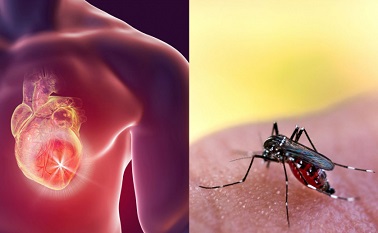BREAKING Dengue News! Indian Doctors Warn That Current Dengue Infections Are Also Causing Dengue Induced Myocarditis!
Nikhil Prasad Fact checked by:Thailand Medical News Team Nov 06, 2023 1 year, 5 months, 2 weeks, 16 hours, 39 minutes ago
Dengue News: Dengue fever, a prevalent arthropod-borne viral disease, continues to cast a shadow of concern over countries in Asia and the Pacific region. With over 100 million new dengue infections annually, the disease presents with a spectrum of clinical manifestations ranging from mild undifferentiated fever to severe conditions like dengue hemorrhagic fever (DHF) and dengue shock syndrome (DSS). Recent reports, however, suggest that dengue is evolving, leading to a phenomenon known as "expanded dengue syndrome." This expanded syndrome encompasses atypical manifestations involving various organs, including the liver, nervous system, heart, and kidneys.

In this
Dengue News report, we will delve into a series of cases reported by Indian doctors at the Lady Hardinge Medical College in New Delhi, highlighting the atypical presentation of dengue fever with a focus on cardiac manifestations, including myocarditis-induced cardiogenic shock. This development is a concerning revelation and calls for increased vigilance and early detection in clinical settings.
The Prevalence and Complexity of Dengue
Dengue, a global health issue, affects over 40% of the world's population living in endemic areas. In 2022, the World Health Organization (WHO) reported a two-fold increase in dengue cases worldwide, underlining the relentless challenge this disease poses. In India, the National Center for Vector-Borne Disease Control reported a staggering 2,33,251 dengue cases with 303 deaths in the same year.
Dengue myocarditis is a rare but severe complication of the disease, affecting a significant proportion of dengue patients. Myocarditis refers to inflammation of the heart muscle, which can lead to a range of cardiac issues. In hospital-based studies, the prevalence of myocarditis among dengue patients was found to be approximately 4.2%, and all these patients displayed elevated levels of cardiac troponin I (cTn-I). Furthermore, 59.5% of these patients exhibited at least one ECG abnormality, and 24% had a reduced ejection fraction (EF) below 55%.
One striking observation from these studies was that patients with abnormal ECG findings had a prolonged hospital stay, averaging three days. Elevated cTn-I levels were also significantly associated with in-hospital mortality, suggesting that the presence of myocarditis can be a crucial factor in determining the clinical outcome of dengue patients.
Case Presentations: Unmasking Dengue-Induced Myocarditis
The Lady Hardinge Medical College's case series illustrates the atypical cardiac manifestations of dengue fever. Let's take a closer look at three cases:
Case 1: A 27-year-old female patient presented with typical dengue symptoms, including fever, vomiting, malaise, headache, and retro-orbital pain. Despite a seemingly unremarkable initial examination, the patient experienced per rectal bleeding, and subsequent tests revealed positive nonstructural protein 1 antigen (NS1Ag). During her hospitalization, the patient's condition worsened, with polyserositis, breathlessness, and elevated cardiac biomarkers. She was eventually diagnosed with myocarditis and card
iogenic shock, requiring intensive care, mechanical ventilation, and blood transfusions.
Case 2: A 44-year-old female with known hypothyroidism was admitted with a history of hematemesis, high-grade fever, and headache. After fluid restoration to address hypovolemic shock, dengue fever with myocarditis was suspected due to persistent tachycardia and raised cardiac biomarkers. This patient recovered with conservative management.
Case 3: A 28-year-old male with a history of rheumatoid arthritis presented with fever, abdominal pain, hematochezia, and dizziness. After a rapid progression to cardiogenic shock, the patient went into sudden cardiac arrest. Despite aggressive interventions, including blood transfusions and mechanical ventilation, the patient did not survive.
Unraveling the Implications of Dengue-Induced Myocarditis
The documented cases of dengue-induced myocarditis underscore the evolving nature of dengue fever. While the classical symptoms of dengue include thrombocytopenia, fever, weakness, fatigue, and vomiting, atypical manifestations such as myocarditis can lurk beneath the surface. What is particularly concerning is that patients with no history of cardiac issues exhibited sinus tachycardia and elevated cardiac markers, such as troponins, on their electrocardiograms. These observations align with the diagnostic criteria set by the European Society of Cardiology (ESC) for myocarditis.
Furthermore, one commonality among these cases was elevated ferritin levels following blood transfusion, potentially contributing to inflammation and cardiac dysfunction. This finding calls for a more profound exploration of such complications and emphasizes the need for advancements in treatment to reduce mortality.
It is essential to recognize that there is currently no specific treatment for the dengue virus, making early detection and management of complications crucial. With the limitations of existing literature, particularly the lack of early diagnosis of dengue-induced myocarditis in young patients, this study provides valuable evidence to diagnose myocarditis in young adults.
Conclusion: Urgent Need for Vigilance
The rising prevalence of dengue cases, coupled with the emerging threat of myocarditis, demands heightened vigilance in clinical settings. As myocarditis can manifest silently or with subtle symptoms, a high index of suspicion is essential, especially in regions where dengue is endemic. Early detection and intervention are pivotal in preventing further complications and improving patient outcomes.
Myocarditis, although rare in the context of dengue, can have severe consequences. Even in the absence of overt cardiac symptoms, patients with dengue should be closely monitored, and cardiac evaluation should become a routine part of the diagnostic protocol. The recognition of myocarditis as a complication of dengue fever sheds light on the evolving nature of this disease and calls for a comprehensive approach to its management. As the global fight against dengue continues, the medical community must remain vigilant, adapt to the changing landscape of the disease, and work toward better outcomes for affected individuals.
The case series was published in the journal: Cureus.
https://www.cureus.com/articles/201826-a-case-series-of-dengue-myocarditis-a-complication-observed-in-dengue-patients#!/
For the latest
Dengue News, keep on logging to Thailand Medical News.
